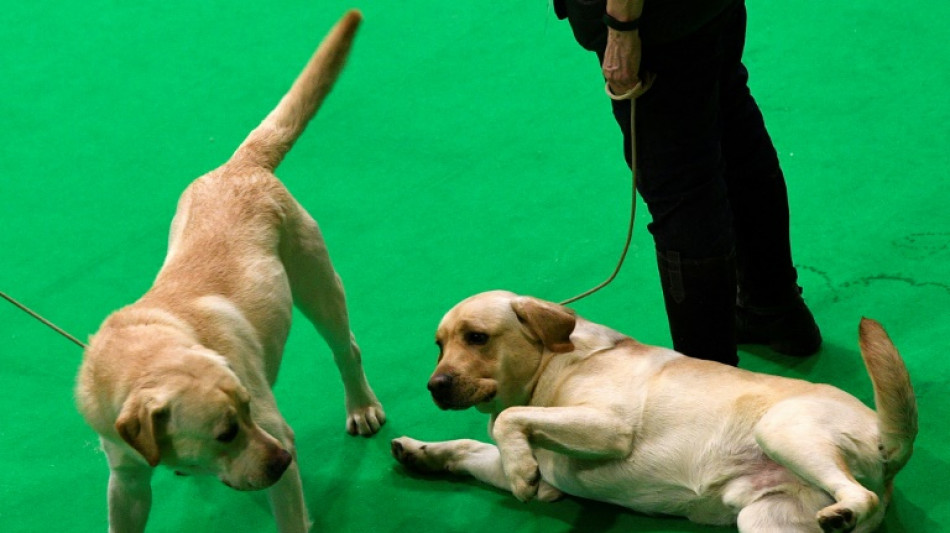
-
 'Weak by design' African Union gathers for summit
'Weak by design' African Union gathers for summit
-
Nigerian conservative city turns to online matchmaking for love

-
 Serb-zero: the 'iceman' seeking solace in extreme cold
Serb-zero: the 'iceman' seeking solace in extreme cold
-
LeBron James nabs another NBA milestone with triple-double in Lakers win

-
 Hundreds of thousands without power after storm lashes France
Hundreds of thousands without power after storm lashes France
-
US Congress impasse over migrant crackdown set to trigger partial shutdown

-
 AI's bitter rivalry heads to Washington
AI's bitter rivalry heads to Washington
-
South Korea hails 'miracle' Choi after teen's landmark Olympic gold

-
 England seek statement Six Nations win away to Scotland
England seek statement Six Nations win away to Scotland
-
Trent return can help Arbeloa's Real Madrid move forward

-
 Battling Bremen braced for Bayern onslaught
Battling Bremen braced for Bayern onslaught
-
Bangladesh nationalists claim big election win, Islamists cry foul

-
 Tourists empty out of Cuba as US fuel blockade bites
Tourists empty out of Cuba as US fuel blockade bites
-
Tearful Canadian mother mourns daughter before Carney visits town shaken by killings

-
 Italy dream of cricket 'in Rome, Milan and Bologna' after historic win
Italy dream of cricket 'in Rome, Milan and Bologna' after historic win
-
Oscars museum dives into world of Miyazaki's 'Ponyo'

-
 Dieng powers Bucks over NBA champion Thunder
Dieng powers Bucks over NBA champion Thunder
-
Japan seizes Chinese fishing vessel, arrests captain

-
 Bangladesh political heir Tarique Rahman poised for PM
Bangladesh political heir Tarique Rahman poised for PM
-
Asian stocks track Wall St down but AI shift tempers losses

-
 Bangladesh's BNP claim 'sweeping' election win
Bangladesh's BNP claim 'sweeping' election win
-
Drones, sirens, army posters: How four years of war changed a Russian city

-
 Crowds flock to Istanbul's Museum of Innocence before TV adaptation
Crowds flock to Istanbul's Museum of Innocence before TV adaptation
-
North Korea warns of 'terrible response' if South sends more drones

-
 NASA crew set for flight to ISS
NASA crew set for flight to ISS
-
'Punk wellness': China's stressed youth mix traditional medicine and cocktails

-
 Diplomacy, nukes and parades: what to watch at North Korea's next party congress
Diplomacy, nukes and parades: what to watch at North Korea's next party congress
-
Arsenal, Man City eye trophy haul, Macclesfield more FA Cup 'miracles'

-
 Dreaming of glory at Rio's carnival, far from elite parades
Dreaming of glory at Rio's carnival, far from elite parades
-
Bangladesh's BNP heading for 'sweeping' election win

-
 Hisatsune grabs Pebble Beach lead with sparkling 62
Hisatsune grabs Pebble Beach lead with sparkling 62
-
What is IRA Eligible Gold? Complete Guide to IRA Approved Metals and Gold IRA Investing Released

-
 CelLBxHealth PLC - Aligning Regulatory Approach with Commercial Needs
CelLBxHealth PLC - Aligning Regulatory Approach with Commercial Needs
-
Venezuela amnesty bill postponed amid row over application

-
 Barca taught 'lesson' in Atletico drubbing: Flick
Barca taught 'lesson' in Atletico drubbing: Flick
-
Australia's Liberals elect net zero opponent as new leader

-
 Arsenal must block out noise in 'rollercoaster' title race: Rice
Arsenal must block out noise in 'rollercoaster' title race: Rice
-
Suns forward Brooks banned one game for technical fouls

-
 N. Korea warns of 'terrible response' if more drone incursions from South
N. Korea warns of 'terrible response' if more drone incursions from South
-
LA fires: California probes late warnings in Black neighborhoods

-
 Atletico rout Barca in Copa del Rey semi-final first leg
Atletico rout Barca in Copa del Rey semi-final first leg
-
Arsenal held by Brentford to offer Man City Premier League title hope

-
 US snowboard star Kim 'proud' as teenager Choi dethrones her at Olympics
US snowboard star Kim 'proud' as teenager Choi dethrones her at Olympics
-
Chloe Kim misses Olympic milestone, Ukrainian disqualfied over helmet

-
 Tech shares pull back ahead of US inflation data
Tech shares pull back ahead of US inflation data
-
'Beer Man' Castellanos released by MLB Phillies

-
 Canada PM to join mourners in remote town after mass shooting
Canada PM to join mourners in remote town after mass shooting
-
Teenager Choi wrecks Kim's Olympic snowboard hat-trick bid

-
 Inter await Juve as top guns go toe-to-toe in Serie A
Inter await Juve as top guns go toe-to-toe in Serie A
-
Swiatek, Rybakina dumped out of Qatar Open


Chunky canines: Study reveals dog obesity gene shared by humans
Obesity is on the rise not just in humans but in dogs, whose history of selective breeding makes them an ideal species for studying the balance between genetics, diet, and lifestyle in weight gain.
In a new paper published Thursday in Science, researchers identified a gene strongly linked to obesity in pet pooches -- and found it is also associated with weight gain in humans.
"The prevailing attitude towards obesity is that people are just a bit rubbish about controlling what they eat, whereas actually, our data shows that if you're a high-risk individual, it takes more effort to keep you slim," lead author Eleanor Raffan, a researcher in the University of Cambridge's Department of Physiology, Development, and Neuroscience, told AFP.
A veterinarian as well as a scientist, Raffan has long sought to study animal genetics to uncover broader biological insights that apply across species, including our own.
For this study, she and her colleagues focused on British Labrador Retrievers.
"Anyone who knows dogs will understand that starting with Labradors is a good idea because they're very prone to getting obese," she said. "They've got this reputation for being really foodie dogs, really obsessed by food."
The team collected slobber samples from 241 dogs and conducted a genome-wide association study, which examines an organism's entire set of genes to identify areas linked to a specific trait.
The top five genes were also present in humans, with the one exerting the strongest influence called DENND1B.
They also assessed how much the dogs pestered their owners for food and whether they were fussy eaters.
"Low-risk dogs tended to remain a healthy weight, irrespective of how their owners managed their food and exercise," said Raffan. "But if you were a high-genetic-risk dog, then if your owners were complacent about diet and exercise, you were likely to get really, really overweight."
For Raffan, the study has two major takeaways.
First, it sheds new light on how DENND1B affects a brain pathway responsible for regulating energy balance and appetite. Known as the leptin-melanocortin pathway, this system is a key target for some anti-obesity drugs.
"Only by understanding biology and the nuances of it can we possibly improve our treatment and management of obesity," she said.
Second, the study allowed researchers to quantify genetic risk for obesity in individual dogs -- and the level of effort required to keep them at a healthy weight. This is easier to measure in dogs than in humans, since their diet and exercise are entirely controlled by their owners.
"We shouldn't be rude to owners of overweight dogs," Raffan emphasized.
"It's not that they're hopeless individuals who don't care about their pets. It's just that they've got animals who persistently seek out opportunities to eat, and just a little bit extra every day is enough to cause weight gain over time."
Y.Nakamura--AMWN


